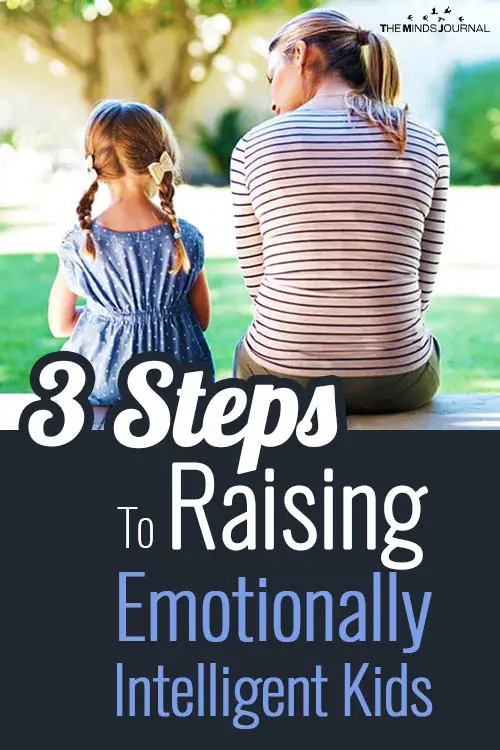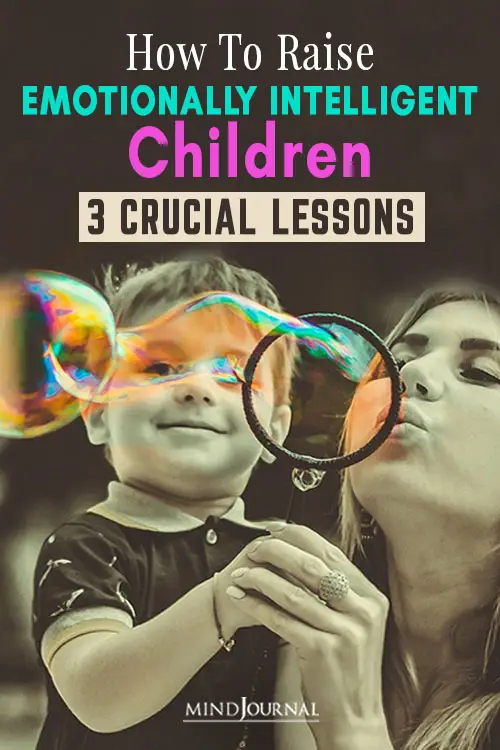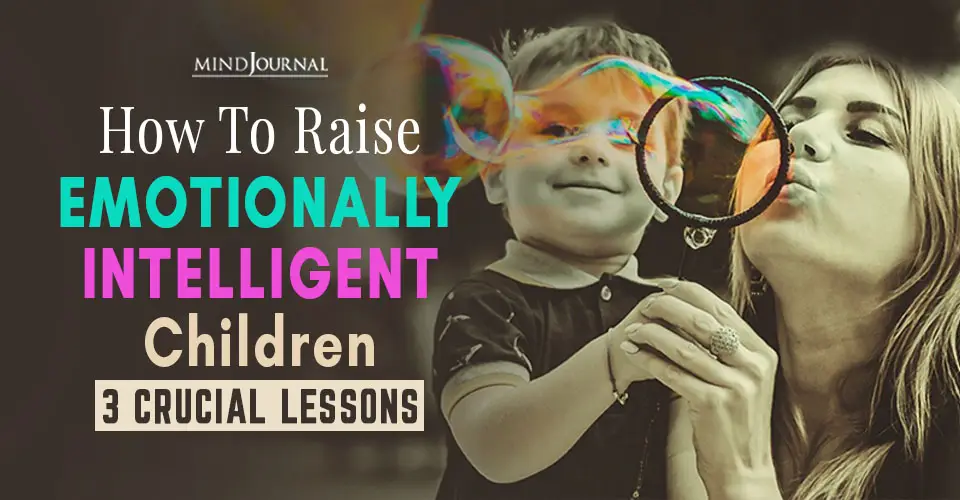Every parent wants the best for their child. We want to raise our kids as strong adults capable of leading happy lives with good moral standing. However, this requires we teach our kids the importance of recognizing their emotions and expressing their feelings in healthy ways. Read on to find out how to raise emotionally intelligent children as it is mandatory for developing great relationships.
“Emotional intelligence begins to develop in the earliest years. All the small exchanges children have with their parents, teachers, and with each other carry emotional messages.” – Daniel Goleman
What kind of child do you want to raise?
Parenting and raising a child who grows up to have deep emotional intelligence starts with you, their parent.
What kind of child do you want to raise? How are you living that life as an adult right now?
Take this important piece of parenting advice: We can not give our kids something that we do not have.
I can not expect my kids to have control of their phone usage if I don’t have control of my phone usage. I can’t expect my kids to try new things if I don’t try new things. I can’t expect my kids to choose foods that are helpful for their bodies if I don’t choose foods that are helpful for my body.
When I look in the mirror, am I the adult I’m trying to raise my child to be? I often ask myself, “What do I want for my kids in a year? Five years? Ten years? How am I modeling that as a parent or adult in this world?”
I can not teach my kids how to regulate their emotions if I don’t know how to regulate my own. The better I care for myself and my mental, emotional, and physical health, the better my kids will be able to care for theirs. In order for your kids to be emotionally intelligent, you need to be emotionally intelligent, yourself.
What is Emotional Intelligence (EQ) and how do you achieve it so your kids can model your behavior? Psychology Today defines it as “the ability to identify and manage one’s own emotions, as well as the emotions of others.”
Look in the mirror.
In order for our kids to be able to process their emotions from a strong, empowered place, we parents have to know how to do that. So, if you’re anything like me, I didn’t know how to manage my own emotions in effective, healthy ways. I certainly knew how to manage my emotions in ineffective and unhealthy ways such as overeating, drinking, blaming others, and procrastinating.
I also tried to manage my emotions by trying to control what happened ahead of time so I wouldn’t feel difficult emotions. (Spoiler Alert: This isn’t possible)
I approached parenting from a place of control, thinking I could somehow control their experiences so they’d never feel difficult emotions (and thus, neither would I). I tried to control my kids’ experiences (helicopter mama-extraordinaire) while also trying to control how everyone felt in the process.
At some point, I realized that not only was it impossible to control others, but it also made me one anxious, overstrung mom.
“I call the parents who get involved with their children’s feelings “Emotion Coaches.” Much like athletic coaches, they teach their children strategies to deal with life’s ups and downs. They don’t object to their children’s displays of anger, sadness, or fear. Nor do they ignore them. Instead, they accept negative emotions as a fact of life.” – John M. Gottman, Raising An Emotionally Intelligent Child
Related: 25 Effective Parenting Rules For Mothers With Sons
There were two truths I had overlooked:
1. I can not control other people’s thoughts.
I could not make my kids think of certain things so that they would feel certain ways. Even if I cleared their paths so their lives were pretty drama-free, they still could choose thoughts that would cause them to feel difficult emotions.
Remember, the Thought Model — it’s their thoughts that create their feelings, not the things that happen in their lives.
2. Everyone faces adversity.
Thriving, confident young adults do not emerge from childhoods of having everything handed to them on silver platters and with no adversity. Look around at the people you admire.
They’ve had challenging experiences that they’ve moved through and learned from. Thriving confident adults develop from having difficult experiences in supportive homes where they learn from them.
So, how do we do this?
The good news is, once you learn how to process your emotions, you can teach your kids how to process theirs. The steps are the same, regardless of age.
Otherwise, if you’ve been listening for a while, you know that the thoughts we focus on, create the feelings we feel. What’s happening is that the thoughts we focus on releasing a chemical in our brain that creates the energy of basic emotions in our body.
Emotions are energy in motion and emotions are actually energy in your body. They can not be wished away. Once the energy is in your body, it needs to be processed.
What that means is if your child is upset, it does not help to say, “You shouldn’t be upset about that.” Or if they say they’re scared, it does not help to say, “That silly thing? You shouldn’t be scared.”
The energy from the emotion is already in their body and needs to be released.
How many times have you done this to yourself as an adult? Told yourself you “shouldn’t” be upset, disappointed, or nervous, even though you were?
News flash: it doesn’t work on us and it doesn’t work on them. Once you’ve focused on the thought that releases the energy of the emotion, the emotion must be processed. So, the million-dollar question is: How do we process our emotions?
“Emotional intelligence simply means managing your mental state for a positive result.” – David Atta
Related: 3 Do’s and Don’ts for Raising Emotionally Intelligent Kids
Processing an emotion and deepening your own emotional intelligence takes 3 steps.
1. Name it.
Feelings are one word. Say what you feel. Get a list started and hang it on the fridge.
2. Describe it.
Emotions are energy in your body. Where do you feel the feeling? What does sadness feel like? What does loneliness feel like?
I encourage my kids to explain the physical feeling of the emotion in detail as if they were explaining it to an alien who had never felt that emotion before. Where exactly do they feel it in their bodies? Is it hot? Cold? Tight? The more descriptive the better.
3. Sit with it.
Allow yourself to feel the emotion. The physical sensation of the feeling is not acutely painful. You are capable of feeling it though we are accustomed to resisting this step.
Sit and allow the energy to move through you. Emotions come in waves — they come and they go. Instead of explaining why you’re feeling what you’re feeling, judging it, or resisting it, sit with it. Experience it.
I like to put my hand on my heart when I’m feeling a more difficult emotion and lift my hands to the sky when I’m feeling a joyous experience.
This is the beauty of being human. We are here to feel our emotions. Feel your life. Live your experience.
So, practice, practice, practice these steps consciously as many times as you can during your day with both big and small emotions.
How do you feel when waiting in line at the grocery store? Name it. Describe it. Sit with it.
How do you feel when you see your husband after a day of work? Name it. Describe where you feel it in your body. Sit with it.
We get good at what we practice. So, let’s practice emotional intelligence.
The better you get, the more capable you will be at modeling it for your kids. Start bringing emotions into your household and sharing your emotions with your family.
For example, you can say, “I feel nervous because I haven’t prepared for my big talk next week. My chest feels tight and hot.”
You can also verbally explain and model how nothing has gone wrong. It’s normal to feel nervous when we haven’t prepared for something big.
We’re not going to fall to the ground or blow up. We can feel the feeling without pouring a glass of wine or complaining about the event organizer. We can model ourselves moving through these three steps.
We name it, describe it, allow it. We process the emotion and then decide what to do from a non-reactive place.
This is the difference between feeling our emotions and reacting to our emotions.
Think of the last time you felt anxious. What did you do? Did you sit with your hand on your heart and tell yourself it was okay? I’ll bet you did something more along the lines of getting on your phone to “check something”, putting food in your mouth, or pouring yourself a glass of wine.
Related: Conscious Parenting: The Art Of Raising Happy Children
“Even though a high IQ is no guarantee of prosperity, prestige, or happiness in life, our schools and our culture fixate on academic abilities, ignoring the emotional intelligence that also matters immensely for our personal destiny.” – Daniel Goleman
Feeling our emotions without reacting to them may seem terrifying but it gets easier with practice.
The ability to process our emotions without reacting to them takes daily practice and is something I expect to be working on for the rest of my life. The more I involve my kids in my safe emotional management, the more they develop their own emotional intelligence.
Different parents have different parenting styles but we all want the same thing: happy kids who know how to handle their emotions when times get tough. When my kids accept difficult emotions as a natural and inevitable part of life, they don’t fear it as much. They acknowledge their feelings and have the confidence to process them. They learn they can handle whatever emotion comes their way.
So, look for ways to practice the 3-steps of emotional processing. Dig into feeling all of what this magnificent life has to offer. Know that I am here to help on your journey.
Not all days are easy but all days are opportunities.
Want to know more about why it’s important to raise emotionally intelligent children? Check this video out below!
“When parents offer their children empathy and help them to cope with negative feelings like anger, sadness, and fear, parents build bridges of loyalty and affection.” – John M. Gottman, Raising An Emotionally Intelligent Child
Emotional intelligence empowers our kids to build meaningful relationships as they grow up. It will allow them to live happy and successful lives. This is why parents need to become role models and exhibit positive, healthy, and good behavior in their own relationships, partnerships, and love.
Following the tips mentioned above will help you raise emotionally healthy, self-confident, and bright individuals capable of easily navigating through the complexities of life.
Written By Susie Pettit Originally Appeared On YourTango










Leave a Reply
You must be logged in to post a comment.